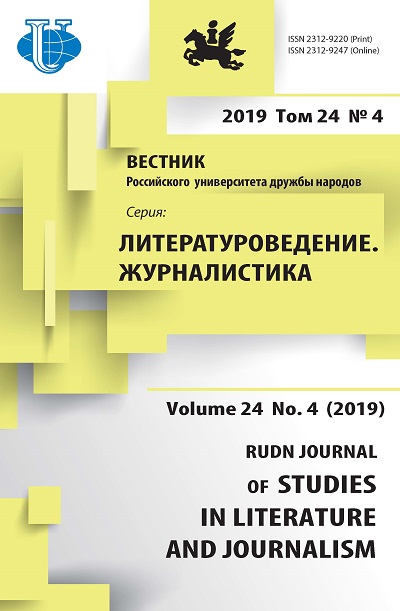A. Zhaksylykov’s novel “Singing Stones” in aspect of the literary domain theory
- Authors: Valikova O.A.1, Bakhtikireeva U.M.1
-
Affiliations:
- Peoples’ Friendship University of Russia (RUDN University)
- Issue: Vol 24, No 4 (2019)
- Pages: 633-648
- Section: LITERARY CRITICISM
- URL: https://journals.rudn.ru/literary-criticism/article/view/23064
- DOI: https://doi.org/10.22363/2312-9220-2019-24-4-633-648
- ID: 23064
Cite item
Full Text
Abstract
The authors of the article believe that the symbolic systems to which the language belongs form structured databases in a certain way - domains that develop according to specifi c rules and aff ect the culture of a language community. According to the hypothesis of the research presented in the paper, Russian-language literature is a special cultural domain generated by the ethnogenetic (in this case, Kazakh) and canonical (Russian) fi elds of culture. It was found that at the crossroads of cultures - and literatures - a new aesthetic phenomenon is being formed, which modern literary criticism has yet to describe. The main objectives of the study included interpretation of the text by the method of hermeneutic commentary, elimination of linguocultural lacunae, and complex poetic analysis. The research material was the fi rst pentalogy novel by A. Zhaksylykov “Dreams of the Damned” - “Singing Stones”. The authors conclude that modern Russian literature gravitates not so much to the Russian (in the strict sense of the term) language fi eld as to the Russophonic or translingual fi eld, using the term by professor Steven Kellman.
About the authors
Olga A. Valikova
Peoples’ Friendship University of Russia (RUDN University)
Author for correspondence.
Email: vestnik_valikova@mail.ru
PhD in Philology, Professor Assistant at the Department of Russian Language and Intercultural Communication
10 Miklukho-Maklaya St., bldg. 2, Moscow, 117198, Russian FederationUldanai M. Bakhtikireeva
Peoples’ Friendship University of Russia (RUDN University)
Email: uldanai@mail.ru
Doctor in Philology, Professor at the Department of Russian Language and Intercultural Communication
10 Miklukho-Maklaya St., bldg. 2, Moscow, 117198, Russian FederationReferences
- Alimzhanova G.M. Sopostavitel’naja lingvokul’turologija // Current contents. http:// gendocs.ru (accessed: 05.11.2019).
- Volkova P.D. Most cherez bezdnu. Kn. 1. Moscow: Zebra Publ., 2014. 304 p.
- Zhaksylykov A.Zh. Sny okajannyh: trilogija. Almaty: Almatinskij izdatel’skij dom Publ., 2006. 526 p.
- Zaliznjak A.A. Grammaticheskij slovar’ russkogo jazyka. Slovoizmenenie. Russkij jazyk. Moscow, 1980. P. 745.
- Karakozova Zh.K., Hasanov M.Sh. Kosmos kazahskoj kul’tury // Evrazija. 2001. Issue. 2. Pp. 106–112.
- Lotman Ju.M. O metajazyke tipologicheskih opisanij kul’tury: izbrannye stat’i: in 3 vols. Vol. 1. Tallin, 1992. P. 386.
- Nauryzbaeva Z. Kazahskaja kul’tura, mifologija i muzyka // Current contents. http:// otuken.kz/index.php/mythzira/49-2010-06-20-07-04-43 (accessed: 10.11.2019).
- Tjen I. Filosofi ja iskusstva. Moscow: Respublika Publ., 1996. Pp. 10–19.
- Franc M.-L. von. Fenomeny Teni i Zla v volshebnyh skazka / per. s angl. V. Mershavki. Moscow: Klass Publ., 2010. 360 p.
- Csikszentmihalyi M. Kreativnost’. Potok i psihologija otkrytij i izobretenij / per. s angl. I. Jushhenko. Moscow: Kar’era Press, 2013. 528 p.
- Eco U. Vertigo: krugovorot obrazov, ponjatij, predmetov. Moscow: SLOVO Publ., 2017. 408 p.
- Jeliade M. Istorija very i religioznyh idej: in 3 vols. Vol. 3. Ot Magometa do Reformacii // Current contents. http://www.e-reading.co.uk (accessed: 10.11.2019).
- Jesalnek A.Ja. Arhetip // Vvedenie v literaturovedenie / L.V. Chernec, V.E. Halizev, A.Ja. Jesalnek i dr.; pod red. L.V. Chernec. 5th ed. Moscow: Akademija Publ., 2012. 720 p.
- Snyder B. Save the cat: the last book on screenwriting you’ll ever need. Michigan: Michael Wiese Productions, 2005.
Supplementary files















